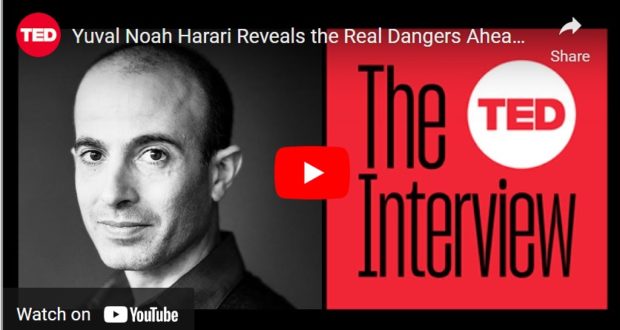📌 القيم المجتمعية “خيالات” أو “قصص”..!!
📌 العلم يدور حول القوة وليس الحقيقة.. ولدينا القوة عَ البشر ومشاعرهم الذاتية، وخيالاتهم، مما يجعلهم يؤمنون بشيء ما..
📌 الحقيقة والقوة يمكن أن يسافرا معًا فقط حتى الآن. عاجلاً أم آجلاً يذهبون في طريقهم المنفصل. إذا كنت تريد القوة، يتعين عليك نشر التخيلات..
إميلي مانجياراسينا – مستشار المنتدى الاقتصادي العالمي يوفال هراري يرفض علنًا القيم الموضوعية مثل حقوق الإنسان ، ويصفها “بالخيال” أو “القصص” ، واضح تركيزه على القوة.
يوفال نوح هراري (Yuval Noah Harari) يعتبر بحق أحد أخطر المفكرين المقتدرين والمؤثرين..
ومعروف سمعته السيئة لمستشار المنتدى الاقتصادي العالمي، وذلك بسبب تصريحاته اللاإنسانية ، وتوقعاته البائسة المُحبطة، ودوره في منظمة يبدو أنها تريد السير بهكذا أجندة (لمواجهة المرض (“الذي أنشأناه”) إجعلنا نتتبعك رقميًا).
ولكن كيف يمكننا أن نعرف أن الناس محقّة في مخاوفها من هكذا أقوال لهراري؟
تتلخص الإجابة في هذا السؤال: إذا لم نكن ، في نظر هراري ، البشر بمستوى الحيوانات ، وأصبح الآن “الغالبية العظمى” من سكان العالم غير ضرورية ، فأين يتركنا ذلك؟
على مرأى من الجميع ، أعطانا نقطة فاصلة تنذر بصيغة الاستبداد الجامح. يؤمن هراري بما يُفهم على أنه عقيدة أساسية للماركسية الثقافية: لا توجد حقيقة ، فقط القوة.
هو يعترف بوجود واقع علمي موضوعي ، رفض هراري علانية وجود القيم الموضوعية. وهو بذلك يرفض القيم الراسخة، مثل قدسية الحياة البشرية ، كأساس للمجتمع وقوانينه.
لقد أوضح ذلك في مقابلة حديثة مع كريس أندرسون ، رئيس مجموعة TED الإعلامية ، نفس المقابلة التي أعلن فيها بشكل سيء السمعة أن العالم لا يحتاج إلى “الغالبية العظمى” من سكانه.
في مناقشتهم ، وصف هراري القيم المجتمعية بأنها “خيالات” أو “قصص” ، مستشهداً بحقوق الإنسان كمثال على ذلك. قال إن حقوق الإنسان “ليست حقيقة بيولوجية” ، لكنها “قصة أنشأناها”.
في الواقع ، ذهب هراري سابقًا إلى حد الادعاء بأن “الإنسان العاقل هو نوع ما بعد الحقيقة ، وتعتمد قوته على خلق وتصديق التخيلات”.
يصبح معنى معتقده أكثر وضوحًا بشكل مقلق في مقابلته مع أندرسون ، عندما يبدو أنه ينأى بنفسه تمامًا عن حقوق الإنسان كمبدأ ثابت.
عندما تحدث أندرسون مجددًا عن حقوق الإنسان ، واصفًا إياها أيضًا بأنها “بناء بشري” ، يتدخل هراري ويتحدث عنها بصيغة الماضي ، مشيرًا بوضوح إلى أن الحقوق غير القابلة للتصرف ليست مبدأًا قابلًا للتطبيق بشكل أبدي:
“لقد كانت قصة جيدة جدًا … ولكن من الخطر أيضًا الخلط بين قصة أنشأناها في إطار تاريخي معين ونعتقد أنه يمكننا تطبيقها على أي فترة تاريخية أخرى أو على أي موقع سياسي وجغرافي آخر اليوم في العالم. “
هراري (وأندرسون) متطوران للغاية ، لقد تجاوزا فكرة حقوق الإنسان! في الواقع ، اعتقادهم هو نتيجة طبيعية للإلحاد ، مما يجعل أي اعتقاد تعسفي في القيم الموضوعية.
تم اقتراح ادعاء هراري الماركسي الثقافي بأن القوة قد اغتصبت الحقيقة في مقالاته ومقابلاته السابقة ، مثل عندما ادعى أن العلم يدور حول القوة وليس الحقيقة ، أو عندما كتب أنه “البشر يُفضلون القوة على الحقيقة. “
تم اقتراح هذا الاعتقاد المتعلق أيضًا في مقابلة هراري مع أندرسون ، عندما يسأل الأخير ، “أليس من الممكن أن تكون بعض هذه القصص [قراءة: القيم] أكثر صحة من غيرها؟” ويذكر العلم على أنه شيء لا يريد تصديقه “مجرد قصة أخرى”.
على الفور ، ينجذب هراري إلى موضوع القوة ، فيجيب: “لا ، العلم ليس كذلك. نحن بحاجة إلى التفريق بين نوعين من القوة في التاريخ. لديك القوة على الواقع الموضوعي ، مثل بناء الجسور ، أو علاج الأمراض ، أو بناء قنبلة ذرية. ومن ثم لديك القوة على البشر ومشاعرهم الذاتية ، وخيالهم ، مما يجعلهم يؤمنون بشيء ما “.
يشير هراري هنا إلى أنه يرى النطاق الكامل للواقع من خلال عدسة القوة بدلاً من الحقيقة ، حتى عالمه “الموضوعي” للعلم. كما تكشف الأهمية التي يوليها للقوة على إرادة الإنسان ، من خلال “المشاعر” و “الخيال”.
عندما يتم تجميع أفكاره هنا معًا ، يمكن للمرء أن يرى ظهور رؤية هراري الماركسية ثقافيًا للعالم: يمكن لمن هم في السلطة أن يتلاعبوا بقيم المجتمع لتحقيق غاياتهم الخاصة ، وبدون شيء مثل القيم الموضوعية – بما في ذلك حقوق الإنسان – يصبح المجتمع مستعبدًا للأفكار التعسفية و أهواء حكامها.
في عام 2018 ، كتب هراري ، “الحقيقة والقوة يمكن أن يسافرا معًا فقط حتى الآن. عاجلاً أم آجلاً يذهبون في طريقهم المنفصل. إذا كنت تريد القوة ، فسيتعين عليك في مرحلة ما أن تنشر التخيلات. إذا كنت تريد معرفة الحقيقة عن العالم ، فسيتعين عليك في وقت ما التخلي عن السلطة. سيتعين عليك الاعتراف بأشياء – على سبيل المثال حول مصادر قوتك – من شأنها أن تغضب الحلفاء أو تثبط عزيمة الأتباع أو تقوض الانسجام الاجتماعي “.
“يفضل البشر القوة على الحقيقة. إننا ننفق وقتًا وجهدًا أكبر بكثير في محاولة السيطرة على العالم أكثر من محاولة فهمه – وحتى عندما نحاول فهمه ، فإننا نفعل ذلك عادةً على أمل أن يسهل فهم العالم للسيطرة عليه. لذلك ، إذا كنت تحلم بمجتمع تسود فيه الحقيقة ويتم تجاهل الأساطير ، فلديك القليل لتتوقعه من الإنسان العاقل. من الأفضل أن تجرب حظك مع الشمبانزي “.
بالنظر إلى منصب هراري كمستشار لرئيس المنتدى الاقتصادي العالمي ، الذي يتمتع بنفوذ كبير على مستوى الحكومة والشركات ، علينا أن نسأل: ماذا يقول هذا البيان الصادر عن هراري عن نفسه وعن المنتدى الاقتصادي العالمي؟
World Economic Forum adviser Yuval Harari is a Marxist who believes there is no truth, only power
Emily Mangiaracina – World Economic Forum adviser Yuval Harari openly rejects objective values such as human rights, calling them ‘fictions’ or ‘stories,’ and is unusually fixated on power.
Yuval Noah Harari is rightly regarded by the thinking population as one of the most dangerous intellectuals alive.
The World Economic Forum adviser has already won notoriety for his dehumanizing statements, dystopian predictions, and his role in an organization that appears to be hastening their fulfillment (think digital contact tracing to curb disease).
But how can we know people aren’t simply overreacting to a caricature of Harari?
The answer boils down to this question: If, in Harari’s eyes, we are no higher than the animals, and the “vast majority” of the world’s population is now unnecessary, where does that leave us?
In plain sight, he has given us a foreboding clincher to the formula for unbridled tyranny. Harari believes in what is understood to be a fundamental tenet of cultural Marxism: There is no truth, only power.
That is, Harari believes there is no “truth” in the most consequential and dangerous possible way. While he acknowledges there is an objective scientific reality, Harari has openly rejected the existence of objective values. He thus rejects firm values, such as the sanctity of human life, as a foundation for society and its laws.
He made this clear in a recent interview with Chris Anderson, head of the TED media group, the same interview in which he infamously declared that the world does not need the “vast majority” of its population.
In their discussion, Harari tellingly described societal values as “fictions” or “stories,” citing human rights as one such example. He said that human rights are “not a biological fact,” but a “story we have constructed.”
In fact, Harari has previously gone so far as to claim that “Homo sapiens is a post-truth species, whose power depends on creating and believing fictions.”
The import of his belief becomes disturbingly clearer in his interview with Anderson, when he appears to totally distance himself from human rights as a fixed principle.
When Anderson again brings up human rights, also describing them as a “human construction,” Harari interjects and speaks of it in the past tense, pointedly suggesting inalienable rights are not a timelessly applicable principle:
“It was a very good story…But it’s also dangerous to confuse a story we have constructed in a particular historical setting and think that we can just apply it to any other historical period or to any other political and geographical location today in the world.”
Harari (and Anderson) are so sophisticated, they have transcended the idea of human rights! In fact, their belief is a natural consequence of atheism, which makes arbitrary any belief in objective values.
Harari’s cultural Marxist claim that power has usurped truth has been strongly suggested in his past articles and interviews, such as when he claimed that science is about power and not truth, or when he wrote that “as a species, humans prefer power to truth.”
This concerning belief is also suggested in Harari’s interview with Anderson, when the latter asks, “Isn’t it possible that some of these stories [read: values] are truer than others?” and mentions science as something he doesn’t want to believe “is just another story.”
Immediately, Harari gravitates to the subject of power, answering, “No, science isn’t. We need to differentiate two types of power in history. You have the power over objective reality, like to build bridges, or cure diseases, or building an atom bomb. And then you have the power over humans and their subjective feelings, their imagination, making them believe in something.”
Harari is signaling here that he sees the entire spectrum of reality through the lens of power rather than truth, even his “objective” realm of science. Also revealing is the importance he places on power over the human will, via the “feelings” and “imagination.”
When his ideas here are pieced together, one can see Harari’s culturally Marxist worldview emerge: those in power can manipulate society’s values to their own ends, and with no such thing as objective values — including human rights — society is enslaved to the arbitrary ideas and whims of its rulers.
In 2018, Harari wrote, “Truth and power can travel together only so far. Sooner or later they go their separate ways. If you want power, at some point you will have to spread fictions. If you want to know the truth about the world, at some point you will have to renounce power. You will have to admit things – for example about the sources of your own power – that will anger allies, dishearten followers or undermine social harmony.”
“As a species, humans prefer power to truth. We spend far more time and effort on trying to control the world than on trying to understand it – and even when we try to understand it, we usually do so in the hope that understanding the world will make it easier to control it. Therefore, if you dream of a society in which truth reigns supreme and myths are ignored, you have little to expect from Homo sapiens. Better try your luck with chimps.”
Considering Harari’s position as adviser to the head of the World Economic Forum, which has massive government and corporate influence, we should further ask: What does this statement by Harari say about himself, and the WEF?
 Agoraleaks Agoraleaks
Agoraleaks Agoraleaks







